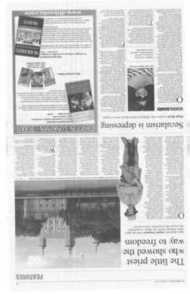Page 13, 19th October 2007
Page 13

Report an error
Noticed an error on this page?If you've noticed an error in this article please click here to report it.
Tags
Share
Related articles
600th Osterley Priest
Church Memorial To Victims Of Jap Camps
40 Cases Of Books For Internees In Japan
German Prisoners Are Well-treated Says The Vatican
The Prison Visitor
Unsung heroes
Prisoners in Java: Accounts by Allied Prisoners of War in the Far East (1942-1945) Captured in Java, edited by Margaret Martin, Hamwic Publishers £19.95 This book comprises accounts by Allied prisoners of war in the Far East collected from the Java Club Journals. These men are the unsung heroes of the last war. Having grown up on a diet of Eagle comics, The Dam Busters and The Colditz Story, my imagination, like many others of my generation, was formed by the battle against Germany. Achtung and Donner und Blitzen (which no German ever exclaims, apparently) were our watchwords. Apart from Alec Guinness's riveting performance in The Bridge over the River Kwai , I knew nothing of the drama played out elsewhere.
So it was with a chastened spirit that I turned these pages, gazed at the faded photographs of young chaps in uniform or skeletal in shabby khaki shorts and scrutinised the pencilled sketches of their prison camps with their dreaded punishment cells and filthy latrines. There are 95 members of the Java Club still alive. Their newsletter was begun in 1984 and in the peculiarly British lingo of jokes and self-deprecation it tells a story that stirs the heart. These men spent three and a half years, from February 1943 to August 1945, as slave labourers of the Japan ese. They endured malaria, dysentery and beriberi, lived on starvation rations and were worked, often literally, to death. "We had to level two hillocks in three months It took us 18 and cost the lives of hundreds" is a typical extract. The contributors' laconic humour conceals memories of constant degradation and humiliation: one man hid his wedding ring in a water bottle that was then thrown overboard: "Somewhere there is a mermaid who thinks she's married," he writes. The Indonesian dish, nasi goreng, cooked in steel helmets, was eaten with relish as "Nazi Goring". It was belatedly discovered that one "Nip guard", graphically told in English that he had "slanting eyes, his parentage was suspect and we hoped he would not live to a ripe old age" had understood every word.
Several men recall the "RC Padre", Fr Patrick Rorke SJ, as a "solid gold hero". He often volunteered to take the beatings of those too weak to accept their punishment, sat with dying and condemned men and shared his meagre rations.
This same priest, who died in 2001, once gave a retreat at my boarding school. He casually mentioned in passing that he had been a prisoner of the Japanese; we, scuffling and inattentive in the pews, knew nothing of his hidden heroism recounted in these pages. The atomic bombs on Hiroshima and Nagasaki ended the war in the Far East. One survivor says he and his fellows learned the news "with little emotion, except to realise they had probably saved our lives and the lives of so many others".
All profits from the sale of this book will be used for the benefit of the survivors: a worthy cause and a good way of remembering the sacrifice of these great Britons.
Jack Carrigan
blog comments powered by Disqus

















